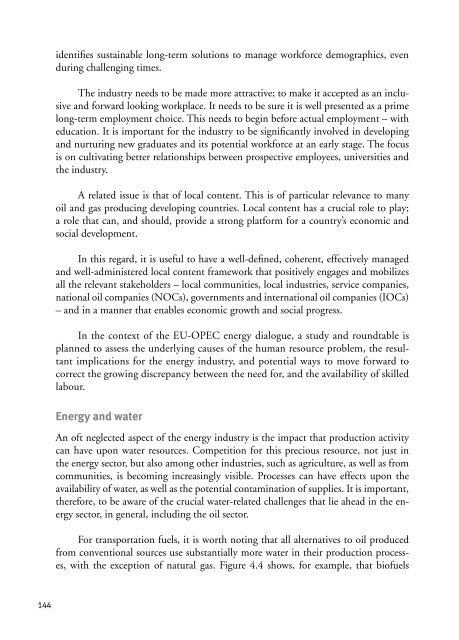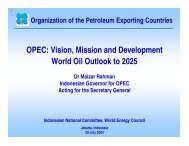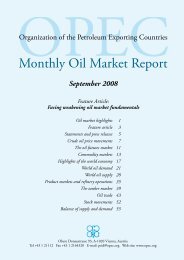Section One
Section One
Section One
You also want an ePaper? Increase the reach of your titles
YUMPU automatically turns print PDFs into web optimized ePapers that Google loves.
144<br />
identifies sustainable long-term solutions to manage workforce demographics, even<br />
during challenging times.<br />
The industry needs to be made more attractive; to make it accepted as an inclusive<br />
and forward looking workplace. It needs to be sure it is well presented as a prime<br />
long-term employment choice. This needs to begin before actual employment – with<br />
education. It is important for the industry to be significantly involved in developing<br />
and nurturing new graduates and its potential workforce at an early stage. The focus<br />
is on cultivating better relationships between prospective employees, universities and<br />
the industry.<br />
A related issue is that of local content. This is of particular relevance to many<br />
oil and gas producing developing countries. Local content has a crucial role to play;<br />
a role that can, and should, provide a strong platform for a country’s economic and<br />
social development.<br />
In this regard, it is useful to have a well-defined, coherent, effectively managed<br />
and well-administered local content framework that positively engages and mobilizes<br />
all the relevant stakeholders – local communities, local industries, service companies,<br />
national oil companies (NOCs), governments and international oil companies (IOCs)<br />
– and in a manner that enables economic growth and social progress.<br />
In the context of the EU-OPEC energy dialogue, a study and roundtable is<br />
planned to assess the underlying causes of the human resource problem, the resultant<br />
implications for the energy industry, and potential ways to move forward to<br />
correct the growing discrepancy between the need for, and the availability of skilled<br />
labour.<br />
Energy and water<br />
An oft neglected aspect of the energy industry is the impact that production activity<br />
can have upon water resources. Competition for this precious resource, not just in<br />
the energy sector, but also among other industries, such as agriculture, as well as from<br />
communities, is becoming increasingly visible. Processes can have effects upon the<br />
availability of water, as well as the potential contamination of supplies. It is important,<br />
therefore, to be aware of the crucial water-related challenges that lie ahead in the energy<br />
sector, in general, including the oil sector.<br />
For transportation fuels, it is worth noting that all alternatives to oil produced<br />
from conventional sources use substantially more water in their production processes,<br />
with the exception of natural gas. Figure 4.4 shows, for example, that biofuels
















